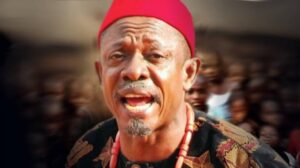
Veteran Nollywood actor and comedian Nkem Owoh, popularly known as “Osuofia,” has made an emotional revelation, recounting how his brother was executed during the military regime of President Muhammadu Buhari in the 1980s.
In a heartfelt statement shared during a recent public appearance, Owoh alleged that his brother was one of the Nigerians executed under a controversial decree signed by then-military Head of State, General Muhammadu Buhari. The decree, which prescribed the death penalty for drug trafficking, was applied retroactively — meaning it was enforced on offenses committed before the law was enacted.
“They used a retroactive law to execute my brother,” Owoh stated. “What kind of justice is that? A law should never apply to the past. It was a painful chapter for my family, and it still hurts.”
The actor’s disclosure has reignited debates around the legality and morality of retroactive legislation, particularly during authoritarian regimes. Buhari’s 1985 regime was marked by strict anti-corruption and anti-drug policies, including the controversial execution of three young men convicted of drug trafficking — a decision that drew international criticism for its disregard of legal principles.
Owoh’s comments have since gone viral, sparking public reactions on social media, with many sympathizing with his loss while others revisited the human rights records of past Nigerian military regimes.
As public discourse continues, legal experts and civil society groups are once again calling for deeper reflections on justice, human rights, and the importance of rule of law in Nigeria’s legal system.




